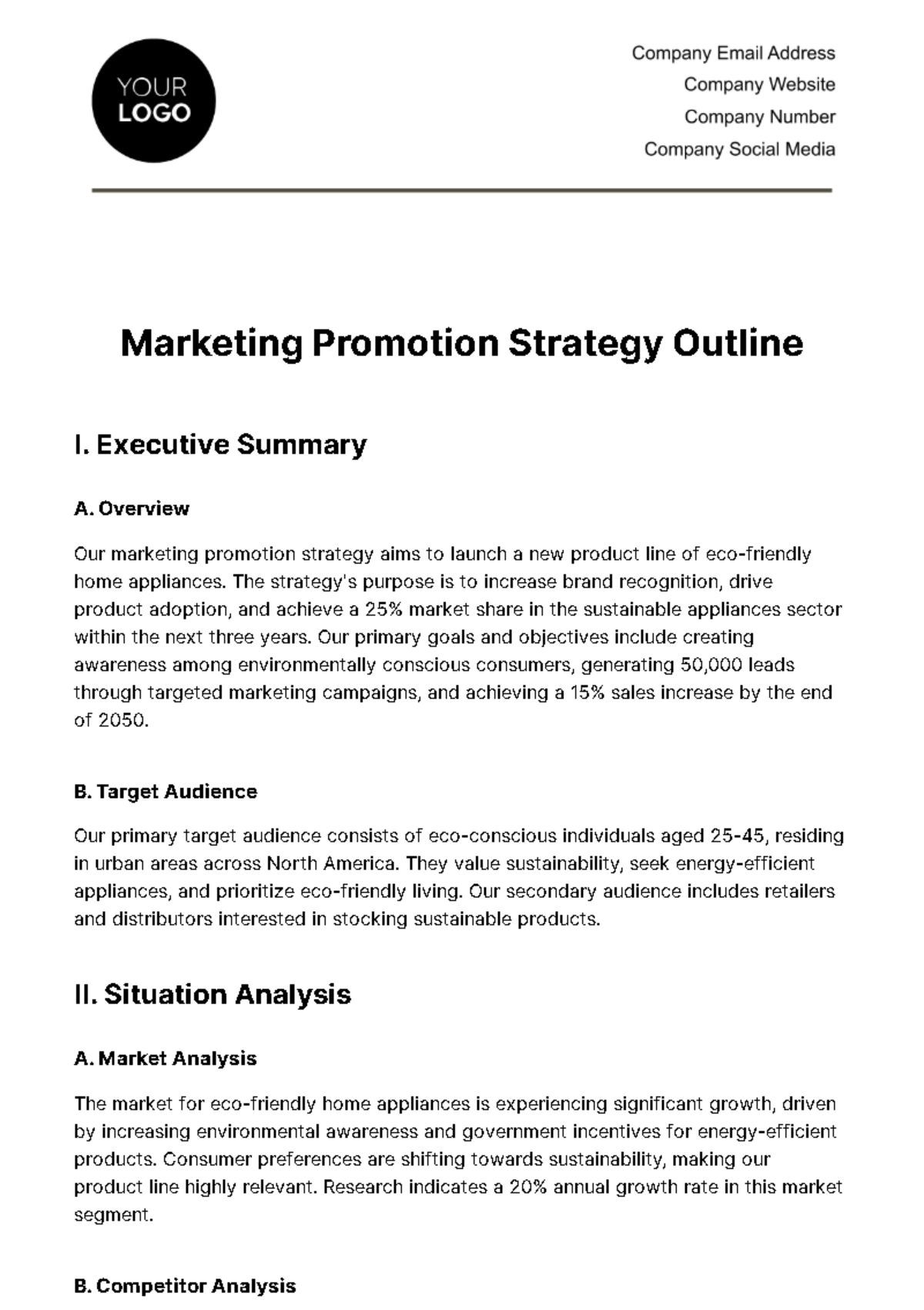Free Marketing Promotion Strategy Outline

- 100% Customizable, free editor
- Access 1 Million+ Templates, photo’s & graphics
- Download or share as a template
- Click and replace photos, graphics, text, backgrounds
- Resize, crop, AI write & more
- Access advanced editor
Introducing the Marketing Promotion Strategy Outline Template by Template.net. This versatile resource is fully editable and customizable to suit your branding needs. Craft compelling marketing plans effortlessly with its user-friendly interface, editable in our Ai Editor Tool. Elevate your promotional strategies with this essential template today.
Marketing Promotion Strategy Outline
I. Executive Summary
A. Overview
Our marketing promotion strategy aims to launch a new product line of eco-friendly home appliances. The strategy's purpose is to increase brand recognition, drive product adoption, and achieve a 25% market share in the sustainable appliances sector within the next three years. Our primary goals and objectives include creating awareness among environmentally conscious consumers, generating 50,000 leads through targeted marketing campaigns, and achieving a 15% sales increase by the end of 2050.
B. Target Audience
Our primary target audience consists of eco-conscious individuals aged 25-45, residing in urban areas across North America. They value sustainability, seek energy-efficient appliances, and prioritize eco-friendly living. Our secondary audience includes retailers and distributors interested in stocking sustainable products.
II. Situation Analysis
A. Market Analysis
The market for eco-friendly home appliances is experiencing significant growth, driven by increasing environmental awareness and government incentives for energy-efficient products. Consumer preferences are shifting towards sustainability, making our product line highly relevant. Research indicates a 20% annual growth rate in this market segment.
B. Competitor Analysis
Our main competitors include EcoTech Appliances and Green Living Solutions. While both have a strong product portfolio, they lack the holistic eco-conscious lifestyle approach we offer. Our strengths lie in innovation and market agility.
C. SWOT Analysis
Strengths: |
|
Weaknesses: |
|
Opportunities: |
|
Threats: |
|
D. Customer Personas and Segmentation
Our primary customer personas include:
Eco-Enthusiast Emma: Female, 30, urban dweller, values sustainability, tech-savvy.
Green Family Greg: Male, 40, suburban, seeks energy savings, family-oriented.
Urban Eco Warrior: Male/Female, 25, urban, environmentally conscious, active on social media.
III. Marketing Promotion Goals and Objectives
A. Objectives
Increase brand awareness by 40% within the first year.
Generate 50,000 leads through targeted online campaigns by the end of the second year.
Achieve a 15% increase in product sales by December 31, 2050.
IV. Target Audience
A. Target Audience
Our target audience includes individuals aged 25-45, residing in urban and suburban areas across North America. They value sustainability, seek energy-efficient appliances, and prioritize eco-friendly living. Psychographically, they are interested in technology, environmental conservation, and convenient living.
V. Key Messaging and Value Proposition
A. Messaging
Our key messages focus on:
"Elevate Your Lifestyle with Eco-Friendly Innovations."
"Cutting-edge Technology for a Sustainable Future."
"Save Energy, Save Money, Save the Planet."
These messages align with our brand's commitment to sustainability and innovation.
VI. Promotion Channels and Tactics
A. Channels and Tactics
Channel | Tactics | Budget Allocation ($) |
Social Media | Organic and paid posts | $50,000 |
Email Marketing | Targeted campaigns | $30,000 |
Content Marketing | Blog posts, eBooks | $20,000 |
Influencer Partnerships | Eco-conscious influencers | $25,000 |
Paid Advertising | Google Ads, Facebook Ads | $40,000 |
Events & Trade Shows | Sustainable Living Expos | $35,000 |
VII. Creative Assets
High-quality product images and videos showcasing eco-friendly features.
Engaging ad copy highlighting product benefits and sustainability.
Consistent branding with green color schemes and eco-conscious visuals.
VIII. Promotion Timeline
Campaign Launch: | January 15, 2051 |
Mid-Year Review: | July 15, 2051 |
Lead Generation Phase: | February 1 - April 30, 2051 |
Sales Boost Campaign: | October 1 - December 31, 2052 |
IX. Budget Allocation
Tactic | Budget Allocation ($) |
Social Media | $50,000 |
Email Marketing | $30,000 |
Content Marketing | $20,000 |
Influencer Partnerships | $25,000 |
Paid Advertising | $40,000 |
Events & Trade Shows | $35,000 |
Contingency Reserve | $10,000 |
Total Budget | $210,000 |
X. Metrics and Key Performance Indicators (KPIs)
A. Metrics and KPIs:
Click-through rates (CTR)
Conversion rates
Incremental sales revenue
Social media engagement (likes, shares, comments)
Email open and click rates
Return on investment (ROI)
B. Benchmarks and Targets:
CTR: 5%
Conversion Rate: 10%
Incremental Sales Revenue: $500,000
Social Media Engagement: 15% increase in engagement metrics
Email Open Rate: 20%
ROI: 300%
XI. Implementation Plan
A. Implementation:
John Smith (Marketing Manager) is responsible for overall strategy execution.
A cross-functional team will be assembled, including designers, content creators, and campaign managers.
Detailed action plans for each tactic will be developed, with weekly progress checks.
B. Contingency Plans:
In case of budget overruns, adjustments will be made by reallocating resources from lower-performing tactics to high-impact channels.
If external factors, such as supply chain disruptions, affect product availability, we will revise the timeline and communication strategy accordingly.
XII. Monitoring and Reporting
Weekly progress meetings to track campaign performance.
Monthly performance reports shared with stakeholders.
Real-time monitoring of digital campaigns for immediate adjustments.
Quarterly reviews to assess strategy effectiveness and make necessary adaptations.
XIII. Conclusion
Our marketing promotion strategy is designed to position [Your Company Name] as a leader in eco-friendly home appliances. By targeting the right audience with compelling messages and utilizing a diverse range of marketing channels, we aim to achieve our objectives, drive sales, and contribute to a more sustainable future. We are committed to regularly reviewing and optimizing our strategy to ensure its success.